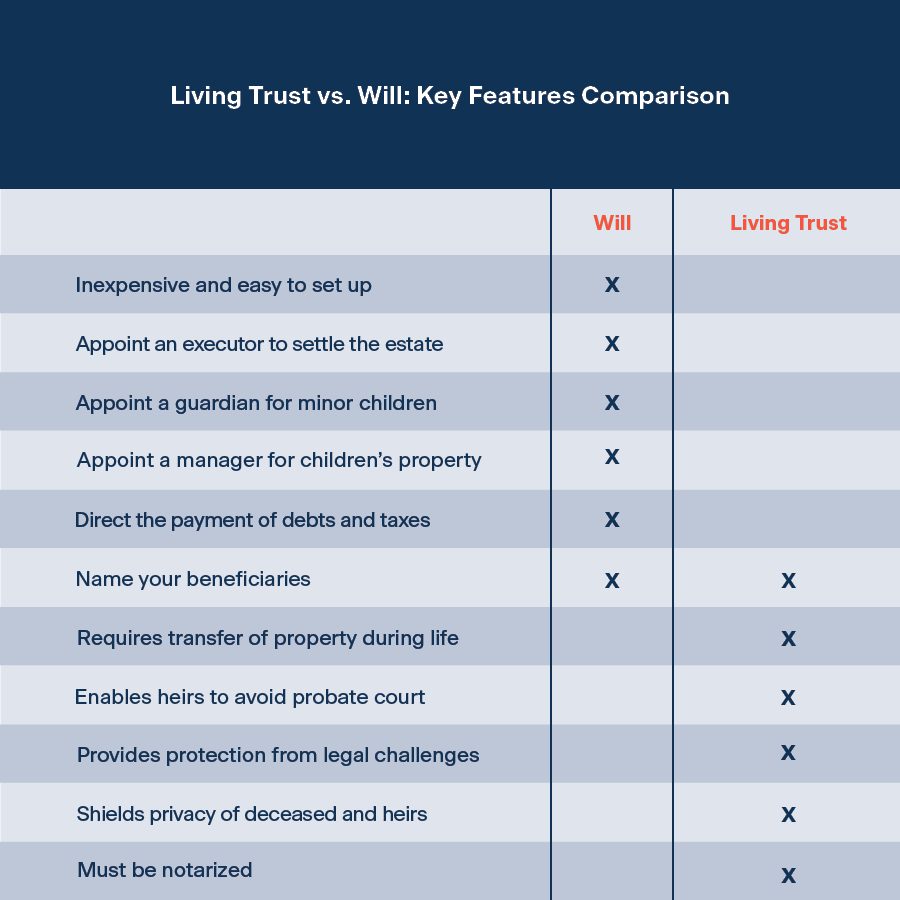If you have a family, you need a will or a living trust – or both, depending on your financial situation. While you many not wish to think about the end of your life, practical estate planning is the only means of securing the confidence that your loved ones are protected and that your final wishes will be honored.
Do I have to have a will or a living trust?
You don’t have to have a will or a living trust; but if you die without leaving legal instructions for the disposition of your assets, your heirs may have to wait for the settlement of your affairs through federal or state legal processes. The most important of these is probate, a court-supervised proceeding that appoints an executor (or approves your named executor) to settle your debts, pay your taxes and distribute any remainder of your estate to the heirs.
What is the difference between a will and a trust?
The person who creates a last will and testament is called the testator. A will becomes effective when the testator dies. The person who establishes a living trust is called the trustor. A trust may be in effect for many years, while the trustor is still alive.
Although you can use either a will or a trust to transfer assets to your heirs, there are important differences in these similar estate planning tools. In this article, we’ll discuss some of the advantages and disadvantages of a trust versus a will, and we’ll help you consider whether you need a living trust, a last will and testament or both. First, let’s begin with some basic definitions.
What is a will?
A will is a legal document that specifies how your assets are to be distributed after you die. In addition to your assets and personal property, a will may provide a list of your debts and other obligations, your instructions for their settlement, and who you want in charge of the process. A will may also specify deeply personal matters, such as your burial wishes.
In most states, a testamentary will has no force until the testator has died. The document must specify who is making the will, that all previous wills are revoked, and it must be signed and witnessed or notarized, depending on state laws.
What if I die without a will?
Should you die intestate, or without a testamentary will, a probate court will decide how your assets and property are distributed. The court may even decide the guardianship of your minor children. If your final instructions have not been made clear, your loved ones could face lengthy public proceedings, with confusion, conflict and even lawsuits delaying their inheritance until your affairs are resolved.
Can I write my own will?
While you can write your own will using a template or a software application, it is highly recommended that you have an attorney review your will to make sure that you have included all of the necessary elements and that you are conforming to all of the rules in the state where you live.
What is typically included in a will?
In addition to a list of your monetary assets and obligations, a will may include specific bequests for the transfer of personal property, such as family jewelry, artwork, furniture or vehicles. These gifts may be to your heirs or to non-family beneficiaries, such as friends or charities. If you co-own a business, you may want buy-sell insurance life insurance to prevent future issues with your business.
Here are some steps to help make sure your will is complete:
- List the assets and property to be transferred to your heirs.
- Identify the individuals who will (or will not) inherit your property.
- Appoint an executor to handle the settlement of your estate.
- Appoint a guardian to be responsible for your minor children.
- Name a trusted person to manage your children’s assets or property.
- Sign and date your will, and have two witnesses sign it as well.
Does my will have to be notarized?
That depends on where you live. In many states, you do not have to sign the will in the presence of a notary – but you must always have at least two adult witnesses who must also sign the will. If you have your will reviewed by an attorney (always a good idea), the lawyer’s office will provide a notary.
Do I need to include the value of my investments?
Investment accounts, 401(k) retirement funds and life insurance policies usually pass directly to a beneficiary who is named in the account or policy, so they do not go through the probate process and need not be included in a will.
Why appoint a guardian for my children?
If your will does not specify a guardian for your minor children prior to your death, your family will have to go to probate court – and they will appoint the guardian. If this happens, the person appointed by the court system may not be someone you would have chosen, so it is very important for you to appoint the guardian of any minor children in your will.
Can I disinherit a family member?
Spouses, former spouses and children (whether natural or adopted) have certain rights of inheritance that are matters of family law in each state. If you wish to disinherit a child or a spouse, you will need the advice of an estate law attorney as to whether your state places more emphasis on community property, equitable distribution or common law rules of inheritance. In any case, you can only disinherit through a will.
Will my heirs have to pay estate tax?
A properly constructed will can help your heirs avoid estate tax liability. As of 2022, an estate tax return will be required if your heirs are to receive at least $12.06 million. If your estate is worth less than that amount, your heirs are probably not liable for Federal estate tax.
Advantages of a Will
- You can write a will yourself (although legal advice is recommended).
- You can write a will with help from templates, software and legal advisories, such as Nolo.
- Even with a review by an estate lawyer, a simple will can be prepared for under $200.
- You can specify who you want as your executor and as the guardian of your minor children.
- Your main assets, such as investments or life insurance, are not subject to probate.
- When your will is ready, you can store and forget it (unless there are changes in your life).
Disadvantages of a Will
- Your will must be authenticated in court through a formal probate proceeding.
- The court must approve your choice of executor and the guardian of your children.
- Your will could be challenged by an estranged spouse, child or heir named in a prior will.
- The private details of your financial settlements and bequests enter the public record.
- Your heirs are subject to estate taxes, without the flexibility to minimize their impact.
- There are limited options for helping or guiding your heirs after their inheritance.
What is a trust?
A trust is another way besides a will to legally transfer your estate according to your wishes. A trust is a legal document that creates a fiduciary relationship in which the trustor (you) gives a trustee (a lawyer, banker or financial advisor) the authority to manage and distribute your assets for a beneficiary (your heir). While many forms of trusts are used to transfer assets, the primary types are testamentary trusts and living trusts.
What is a testamentary trust?
A testamentary trust is a trust specified by a will, which transfers all or a portion of a decedent’s assets in a way that is designed to minimize taxes or to determine how the money can be spent. For example, the trustor may specify that a trust fund is to be used only for a child’s education until the heir reaches the age of 25, at which time the heir has access to all of the balance. It is important to note that although a testamentary trust is triggered by the event of the trustor’s passing, it is not established as a trust fund until the probate process has verified the authenticity of the will and has approved the executor.
What is living trust?
To avoid probate altogether, an asset owner may wish to transfer assets to their loved ones through a revocable living trust. Anyone can establish a living trust, and you can name any competent adult as a trustee (although most trustors choose a bank or trust company). Even you can serve as the trustee during your lifetime.
What can I transfer to a living trust?
The trust is a legal entity that can own any asset, including money, investments or real estate. While in trust, the assets no longer belong to you, so they are not included in the probate process. During your lifetime, any earnings from the trust assets flow to you, as taxable income. Upon your death, the trust’s assets are transferred from the trust to the beneficiaries, according to your instructions. There is no need for a probate attorney, and there are no court fees.
What if I am incapacitated, but still alive?
Before the end of life, some individuals lose their capacity to manage their own financial affairs. This can happen through an accident or an illness, such as Alzheimer’s. If you only have a will, and if you have not created a separate Power of Attorney giving authority to someone should you lose your mental capacity, a court may appoint a conservator. This appointee might not be the person you would choose. In a living trust, you can appoint a spouse or an adult child to manage the trust on your behalf.
Can I appoint an executor in a trust?
No. In a will, you can name an executor to pay your bills and taxes, communicate with the probate court and distribute any remaining assets to your heirs. You cannot name an executor in a trust. However, you will appoint a successor trustee who has the authority to manage the trust property. However, the successor trustee is unable to provide the other services handled by an executor; this is a good argument for having both a trust and a will.
How much does it cost to set up a trust?
The cost to create and manage a trust can vary greatly, depending on your state of residence, the size of your estate and the complexity of your financial situation. An individual can set up a trust online for $300-$500, while an estate planning attorney, banker or trust company officer will charge more. The average cost to have a professional set up a living trust is $1,500 for an individual or $2,500 for a married couple.
What are the advantages of living trust vs. will?
- Adjust any estate planning provision of the trust during your life.
- Protect the privacy of your finances and your beneficiaries.
- Establish practical conditions for beneficiary access to trust funds.
- Segregate trust assets from community property.
- Protect heirs from guardian misconduct.
- Avoid challenges to the estate.
- Minimize estate taxes.
- Avoid probate.
What are the disadvantages of living trust vs. will?
- A typical trust may cost more than $2,000 to set up, plus recurring fees.
- Once established, a trust must be reviewed and maintained over time.
- A trust must be adjusted to fit current investment goals and circumstances.
- Childbirth, divorce and other life changes must be reflected in trust provisions.
- Investments, property and other assets must accommodate the features of the trust.
- Title to the assets must be changed from you personally to ownership by the trust.
- Regular administrative fees will be collected by the bank or trust company trustee.
- Upon the death of the trustor, the successor trustee does not act as an executor.
When should I consider both a will and a trust?
While a trust will enable you to manage the process of transferring your assets and property without getting tied up in the delay and expense of probate, a will can be more effective for estate planning matters, such as appointing a guardian or conveying specific bequests or wishes. If your financial and tax advisors recommend a trust, you should create one. However, since a will is inexpensive and simple to create, you should also consider the advantages of a will.
Living trust vs. will: the bottom line
A last will and testament is the most straightforward (and the most economical) way to transfer your estate and declare your final wishes. But that simplicity comes at the cost of control, with little flexibility to avoid probate, minimize taxes or protect your heirs once your estate has been distributed.
A revocable living trust takes money to establish and more time and money to manage during your lifetime. But the extra cost and effort yield a long list of benefits, including flexibility, privacy and tax-avoidance – as well as practical ways to aid and protect your heirs long after your own lifetime.
Before choosing a trust or a will (or both), take some time to discuss your financial situation with your legal, tax and investment advisors. Let them know how you envision the legacy you want to leave for your loved ones, and these professionals will help you make the most effective choices. Talk to one of our Life Insurance specialists to find out how you can take care of the people who matter to you.







